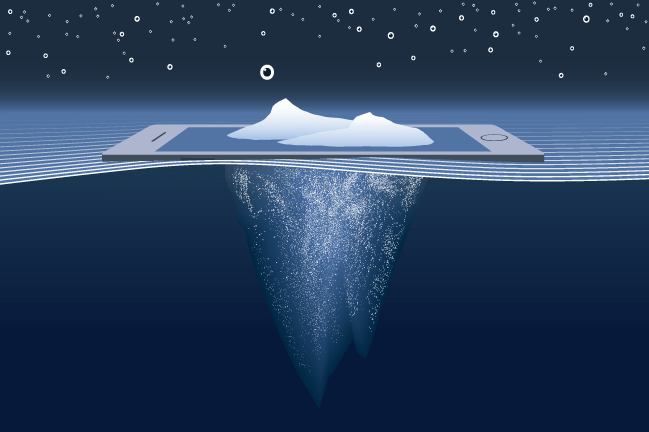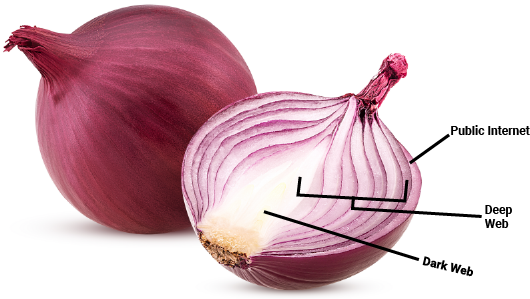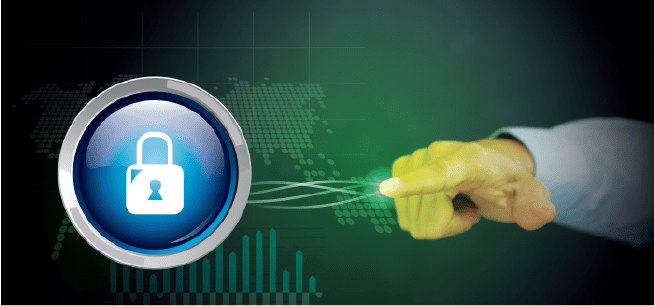
DARK WEB | 5.5 MIN READ
So much is unknown about the dark web and the deep web that even the terminology surrounding both gets confusing. Many people assume that the dark web and deep web are interchangeable terms but they're not. In this article, we'll break down the similarities and differences between the terms and give you actionable tips to keep your information off the dark web.
[Quick Summary] The difference between the dark web and the deep web is that the deep web is a large hidden layer of the Internet with moderate security measures in place while the dark web is a tiny fraction of the deep web with strong security measures that requires special browsers to access.
For more information and to get actionable tips to protect yourself from the dark web, keep reading!
Deep Web
Imagine the Internet as an onion, with layers upon layers. The outermost layers are the easiest to access, and as you peel back the layers, it becomes harder and harder to do so.

If the outermost layer is the publicly accessible Internet that we all know and love, then the deep web is the second layer, which is hidden beneath the surface of the public Internet and is comprised of most web pages.
This is where the confusion between the deep web and dark web arises for most people. You'll see news stations spouting statistics like "96% of the Internet is the dark web and is largely inaccessible to the public". These news stations fail to realize that that fact actually applies to the much more innocuous deep web.
The deep web is less scary than it sounds. Basically, the deep web makes up a majority of the Internet because it is all the content you can't find on search engines, such as a corporation's private database or a company internal website pages.
A thin layer of security protects the public from accessing deep web content, but not as much as the dark web. Consider all the different accounts that you seek to keep private, such as your online banking account or your email.
These websites need to have privacy restrictions for a reason, which is why you can't Google and access somebody's bank account. These protected pages would be considered part of the deep web because search engines don't index them, therefore "hiding" them from most of the public.
For instance, if I am in my online banking portal, I can see a URL at the top of the page. However, if I gave you the URL to my portal, you couldn't paste it and access my account. You have to also have my account credentials to access my banking, which serves as an added security layer.
Websites purposely don’t index these pages for Google to find because only certain people should have access to them.
As for the size of the deep web, according to a study, it is actually 400-550 times bigger than the public Internet. This means that when someone is searching on the Internet, they are only accessing 0.03% — or one in 3,000 — of the pages available to them.
This is because for every website, there are so many more web pages on the deep web. For instance, consider any password-protected websites such as Wells Fargo's online banking portal.
Once a user logs into their bank account, all of the protected pages they can access, such as their checking account information or bank statement, are on the deep web because search engines cannot access these pages.
Keep in mind however, that for protected websites like online banking portals, even if a company has millions of users on its site, that doesn't mean that each user creates unique deep web pages.
For instance, the Wells Fargo checking account page would be a single page on the deep web, and the numbers on that page change based on the user who logs in and looks at that page.
Although there are many pages and websites on the deep web, relatively little are used for illegal purposes.
Dark Web/Darknet

The darknet is another term that gets thrown around when talking about the dark web, so it would be wrong for us to define the dark web without talking about it. The darknet is simply the service that hosts dark web pages and services.
The darknet and dark web comprise the most internal layer of the onion. The dark web is technically a subset of the deep web because it too, isn't publicly accessible. According to Wired, only about 0.01% of the deep web is the dark web.
While some deep web sites can be accessed through special browsers such as Tor, the only way to access the dark web is through special browsers. The dark web is hidden from public view in a few ways.
First, since Google doesn't index for dark web sites, you can't find any by using a search engine. Just to open a dark web site, you have to use a special browser.
For some particularly secretive sites on the dark web, website owners might restrict the IP addresses that are allowed to access the site. Though you could theoretically take the same action with a public Internet site, there isn't as much of a reason to do so as with a dark website.
The dark web is where you can find the illegal activity that is the source of so many rumors. You can access content such as human trafficking and can purchase items such as firearms and drugs.
For individuals and businesses alike, you can potentially find your own personal information on the dark web too.
Stolen information such as credit card numbers, social security numbers, and passport information are sold on the dark web. Though this sounds frightening, the good news is that there are services that will scan the dark web to see what, if any, of your personal information is out there.
Though you cannot fully remove your information once it's on the dark web, knowing what information is out there can give you a warning about what information you should change or protect even further.
Have any lingering questions? Read our definitive guide to the dark web.
How to Protect Yourself from Dark Web Threats

If you're a business owner, the proactive step you can take to prevent your company's information from even getting onto the dark web is to heighten your cyber security efforts.
Taking a proactive approach to cyber security instead of a reactive stance allows you to save yourself the headache of dealing with cyber-attacks and changing company information after you find that it's on the dark web.
Consider managed services if you want a layered approach to cyber security that protects you from the more sinister layers of the Internet.
Managed services install various types of hardware and software to prevent hackers from stealing company information through server break-ins or phishing attempts, among other tactics.
Managed service providers also employ IT experts to monitor your network for suspicious activity and fix any problems that arise.
Though the dark web is a small percentage of the Internet, do you really want to risk leaving you or your company's personal information in the same place that drugs, pedophilia, and human trafficking exist?
READ MORE: Cyber Security Solutions: 12 Best Practices for Businesses
Posted by Erica Kastner

Erica Kastner is a lead Marketing Specialist at Standard Office Systems as well as a University of Georgia graduate. She aims to use her passion for problem-solving to help businesses understand how to better leverage their network infrastructure.

